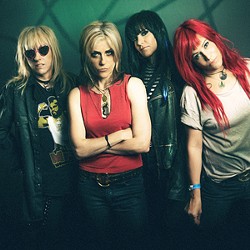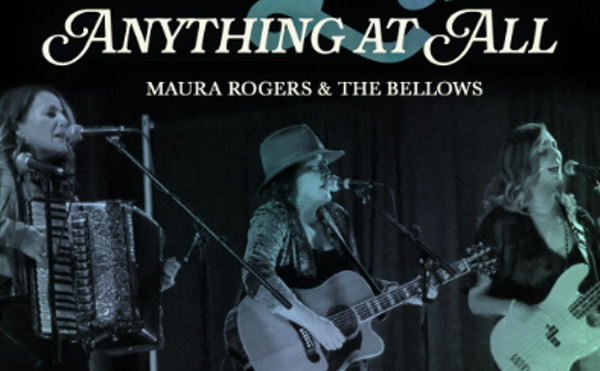L7's Donita Sparks Talks About Why the Hard Rock Band 'Came Back to Bitch'
By Jeff Niesel on Tue, Apr 3, 2018 at 12:23 pm
[
{
"name": "Ad - NativeInline - Injected",
"component": "38482495",
"insertPoint": "3",
"requiredCountToDisplay": "5"
},{
"name": "Real 1 Player (r2) - Inline",
"component": "38482494",
"insertPoint": "2/3",
"requiredCountToDisplay": "9"
}
]
When singer-guitarist Donita Sparks and singer-guitarist Suzi Gardner formed L7 in Los Angeles in 1985, they took inspiration from the city’s art-punk scene.
“We worked in the production department at the L.A. Weekly,” says Sparks in a recent phone interview. L7 plays a sold out show with Death Valley Girls at 8:30 p.m. on Sunday, April 15, at the Beachland Ballroom. “We were young and we had cool mentors to look up to. We were in that scene. Suzi wanted to play hard rock, which wasn’t coming out of the art-punk scene at all. It was a fresh perspective. I think we mostly listened to punk, but there were hard rock bands like Hawkwind and AC/DC and Black Sabbath that Suzi liked. I brought in more of the Ramones and the surf rock element.”
Taking the name L7 because, as Sparks has put it, it sounded “androgynous,” the band inked a deal with Epitaph, the punk imprint run by Bad Religion’s Brett Gurewitz and issued its self-titled debut in 1988, recording the album in Gurewitz’s small office studio that Sparks describes as “an old house in Hollywood.”
L7 would find a new home after Sup Pop reps caught the band play a particularly impactful show in Seattle, the city where the label was based.
“[The Sub Pop guys] liked us even though we sent them running from the room because we put so much smoke onto the stage that you couldn’t even see us,” says Sparks. “You could just hear us. Our smoke guys were high and just loved the way the smoke looked.”
Sup Pop asked the band to record a single and the resulting song, “Shove,” a Mudhoney-like track propelled by heavy guitars and parched vocals, became the very first single that the influential label released in the ’90s, setting the tone for a decade that saw Seattle-based alternative acts such as Nirvana, Alice in Chains and Pearl Jam become massively successful.
“We did feel an affinity with those [grunge] bands,” says Sparks. “We didn’t know them all personally. We liked the Sup Pop promotional materials because they had a sense of humor. I saw Nirvana on their first time down to Southern California. We drove from Los Angeles to Long Beach to see them at [the now-shuttered] Bogart’s. You can see me in the audience in some of those old photos. We got to know them quickly.”
For its third album, 1992’s Bricks Are Heavy, the band teamed up with super-producer Butch Vig (Nirvana, Garbage) and inked a deal with Slash, a label that had international distribution. “Pretend We’re Dead,” a catchy number with softer guitars and vocals, became a hit on commercial radio.
“Slash got us everywhere,” says Sparks, adding that a new documentary film available on Hulu and iTunes chronicles the band’s rise in popularity. “Sub Pop got us to Europe, but Slash got us to Japan and many other places.”
And then, as quickly as the band’s popularity rose, it declined. In 2001, Sparks says the “wheels fell off.”
“We didn’t have a label, and we didn’t have money,” she says. “[Turning] 40 was around the corner, and we didn’t have anything to show for our success. Our friends were buying houses. Suzi, my partner, quit and that was unexpected. That sent the band into separate camps.”
After Sparks launched a Facebook page a couple of years ago for archival purposes, she noticed that the band received a good number of “likes.” That prompted her to relaunch the group.
“We thought we had been swept under the carpet,” she says. “We wanted to give it another go. We had a window to do that. If it had been earlier, we wouldn’t have been able to do it and any later, and I think we would have been too old.”
Since reuniting, the band has cut a couple of new songs too.
With its distorted guitars and double-time drums, “Dispatch from Mar-A-Lago” has a real intensity to it that suggests the band hasn’t lost a step.
“It’s inspired by [President Trump’s] Mar-A-Lago [retreat] and the Secret Service responding to the boy who calls wolf,” says Sparks. “It’s about the craziness of the times. These trained professionals are dealing with someone who’s off the rails. It’s our take on that whole thing.”
Much like “Pretend We’re Dead,” “I Came Back to Bitch” features a catchy riff and sardonic vocals as Sparks sounds a bit like former Dead Kennedys singer Jello Biafra as she squeals, “I came back to bitch.”
“A lot of journalists ask us why we’re back,” says Sparks. “I came back to bitch about everything. What do you got? It’s all bad news. I love it when there’s some wonderful news, but the bad news outweighs the good. We are here to serve. I also like the twist. It’s like, ‘I haven’t begun to bitch yet, so get ready fuckers.’”
“We worked in the production department at the L.A. Weekly,” says Sparks in a recent phone interview. L7 plays a sold out show with Death Valley Girls at 8:30 p.m. on Sunday, April 15, at the Beachland Ballroom. “We were young and we had cool mentors to look up to. We were in that scene. Suzi wanted to play hard rock, which wasn’t coming out of the art-punk scene at all. It was a fresh perspective. I think we mostly listened to punk, but there were hard rock bands like Hawkwind and AC/DC and Black Sabbath that Suzi liked. I brought in more of the Ramones and the surf rock element.”
Taking the name L7 because, as Sparks has put it, it sounded “androgynous,” the band inked a deal with Epitaph, the punk imprint run by Bad Religion’s Brett Gurewitz and issued its self-titled debut in 1988, recording the album in Gurewitz’s small office studio that Sparks describes as “an old house in Hollywood.”
L7 would find a new home after Sup Pop reps caught the band play a particularly impactful show in Seattle, the city where the label was based.
“[The Sub Pop guys] liked us even though we sent them running from the room because we put so much smoke onto the stage that you couldn’t even see us,” says Sparks. “You could just hear us. Our smoke guys were high and just loved the way the smoke looked.”
Sup Pop asked the band to record a single and the resulting song, “Shove,” a Mudhoney-like track propelled by heavy guitars and parched vocals, became the very first single that the influential label released in the ’90s, setting the tone for a decade that saw Seattle-based alternative acts such as Nirvana, Alice in Chains and Pearl Jam become massively successful.
“We did feel an affinity with those [grunge] bands,” says Sparks. “We didn’t know them all personally. We liked the Sup Pop promotional materials because they had a sense of humor. I saw Nirvana on their first time down to Southern California. We drove from Los Angeles to Long Beach to see them at [the now-shuttered] Bogart’s. You can see me in the audience in some of those old photos. We got to know them quickly.”
For its third album, 1992’s Bricks Are Heavy, the band teamed up with super-producer Butch Vig (Nirvana, Garbage) and inked a deal with Slash, a label that had international distribution. “Pretend We’re Dead,” a catchy number with softer guitars and vocals, became a hit on commercial radio.
“Slash got us everywhere,” says Sparks, adding that a new documentary film available on Hulu and iTunes chronicles the band’s rise in popularity. “Sub Pop got us to Europe, but Slash got us to Japan and many other places.”
And then, as quickly as the band’s popularity rose, it declined. In 2001, Sparks says the “wheels fell off.”
“We didn’t have a label, and we didn’t have money,” she says. “[Turning] 40 was around the corner, and we didn’t have anything to show for our success. Our friends were buying houses. Suzi, my partner, quit and that was unexpected. That sent the band into separate camps.”
After Sparks launched a Facebook page a couple of years ago for archival purposes, she noticed that the band received a good number of “likes.” That prompted her to relaunch the group.
“We thought we had been swept under the carpet,” she says. “We wanted to give it another go. We had a window to do that. If it had been earlier, we wouldn’t have been able to do it and any later, and I think we would have been too old.”
Since reuniting, the band has cut a couple of new songs too.
With its distorted guitars and double-time drums, “Dispatch from Mar-A-Lago” has a real intensity to it that suggests the band hasn’t lost a step.
“It’s inspired by [President Trump’s] Mar-A-Lago [retreat] and the Secret Service responding to the boy who calls wolf,” says Sparks. “It’s about the craziness of the times. These trained professionals are dealing with someone who’s off the rails. It’s our take on that whole thing.”
Much like “Pretend We’re Dead,” “I Came Back to Bitch” features a catchy riff and sardonic vocals as Sparks sounds a bit like former Dead Kennedys singer Jello Biafra as she squeals, “I came back to bitch.”
“A lot of journalists ask us why we’re back,” says Sparks. “I came back to bitch about everything. What do you got? It’s all bad news. I love it when there’s some wonderful news, but the bad news outweighs the good. We are here to serve. I also like the twist. It’s like, ‘I haven’t begun to bitch yet, so get ready fuckers.’”
Tags:
SCENE Supporters make it possible to tell the Cleveland stories you won’t find elsewhere.
Become a supporter today.
About The Author
Jeff Niesel
Jeff has been covering the Cleveland music scene for more than 20 years now. And on a regular basis, he tries to talk to whatever big acts are coming through town, too. If you're in a band that he needs to hear, email him at [email protected].
Scroll to read more Music News articles
Newsletters
Join Cleveland Scene Newsletters
Subscribe now to get the latest news delivered right to your inbox.













